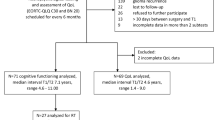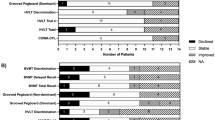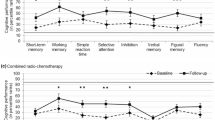Abstract
This review aims to summarize what is currently known about neurocognitive outcome and quality of life in patients with brain tumors treated with radiotherapy. Whether potential tumor-controlling benefits of radiotherapy outweigh its potential toxicity in the natural history of brain tumors is a matter of debate. This review focuses on some of the adult main brain tumors, for which the issue of neurocognitive decline has been thoroughly studied: low-grade gliomas, brain metastases, and primary central nervous system lymphomas. The aims of this review are: (1) the analysis of existing data regarding the relationship between radiotherapy and neurocognitive outcome; (2) the identification of strategies to minimize radiotherapy-related neurotoxicity by reducing the dose or the volume; (3) the evidence-based data concerning radiotherapy withdrawal; and (4) the definition of patients subgroups that could benefit from immediate radiotherapy. For high grade gliomas, the main findings from literature are summarized and some strategies to reduce the neurotoxicity of the treatment are presented. Although further prospective studies with adequate neuropsychological follow-up are needed, this article suggests that cognitive deficits in patients with brain tumor have a multifactorial genesis: radiotherapy may contribute to the neurocognitive deterioration, but the causes of this decline include the tumor itself, disease progression, other treatment modalities and comorbidities. Treatment variables, such as total and fractional dose, target volume, and irradiation technique can dramatically affect the safety of radiotherapy: optimizing radiation parameters could be an excellent approach to improve outcome and to reduce neurotoxicity. At the same time, delayed radiotherapy could be a valid option for highly selected patients.

Similar content being viewed by others
References
Liu R, Page M, Solheim K, Fox S, Chang SM (2009) Quality of life in adults with brain tumors: current knowledge and future directions. Neuro Oncol 11:330–339
Meyers CA, Wefel JS (2003) The use of the mini-mental status examination to assess cognitive functioning in cancer trials: no ifs, ands, buts or sensitivity. J Clin Oncol 21:3557–3558
Keime-Guibert F, Napolitano M, Delattre JY (1998) Neurological complications of radiotherapy and chemotherapy. J Neurol 245:695–708
Laack NN, Brown PD, Ivnik RJ et al (2005) Cognitive function after radiotherapy for supratentorial low-grade glioma: a North Central Cancer Treatment Group prospective study. Int J Radiat Oncol Biol Phys 63:1175–1183
Douw L, Klein M, Fagel SS et al (2002) Cognitive and radiological effects of radiotherapy in patients with low-grade glioma: long-term follow-up. Lancet Neurol 8:810–818
Taphoorn MJ (2009) Neurocognitive effects of radiotherapy. American Society Clinical Oncology Annual Meeting, Educational book manuscript, pp 90–93
Klein M, Heimans JJ, Aaronson NK et al (2002) Effect of radiotherapy and other treatment-related factors on mid-term to long-term cognitive sequelae in low-grade gliomas: a comparative study. Lancet 360:1361–1368
Klein M, Engelberts NH, van der Ploeg HM et al (2003) Epilepsy in low-grade gliomas: the impact on cognitive function and quality of life. Ann Neurol 54:514–520
Reijneveld JC, Stitskoorn MM, Klein M et al (2001) Cognitive status and quality of life in patients with suspected versus proven low-grade gliomas. Neurology 56:618–623
Brown PD, Buckner JC, Uhm JH, Shaw EG (2003) The neurocognitive effects of radiation in adult low-grade glioma patients. Neuro Oncol 5:161–167
Lesser GJ (2001) Chemotherapy of low -grade gliomas. Semin Radiat Oncol 11:138–144
Olson JD, Riedel E, DeAngelis LM (2000) Long-term outcome of low-grade oligodendroglioma and mixed glioma. Neurology 54:1442–1448
Surma-aho O, Niemelä M, Vilkki J et al (2001) Adverse long-term effects of brain radiotherapy in adult low-grade glioma patients. Neurology 56:1285–1290
Postma TJ, Klein M, Verstappen CC et al (2002) Radiotherapy-induced cerebral abnormalities in patients with low-grade glioma. Neurology 59:121–123
Correa DD, Shi W, Thaler HT, Cheung AM, DeAngelis LM, Abrey LE (2008) Longitudinal cognitive follow-up in low grade gliomas. J Neurooncol 86:321–327
Vigliani MC, Sichez N, Poisson M, Delattre JY (1996) A prospective study of cognitive functions following conventional radiotherapy for supratentorial gliomas in young adults: 4-year results. Int J Radiat Oncol Biol Phys 35:527–533
Armstrong CL, Hunter JV, Ledakis GE et al (2002) Late cognitive and radiographic changes related to radiotherapy: initial prospective findings. Neurology 59:40–48
Brown PD, Buckner JC, O’Fallon JR et al (2003) Effects of radiotherapy on cognitive function in patients with low-grade glioma measured by the folstein mini-mental state examination. J Clin Oncol 21:2519–2524
Torres IJ, Mundt AJ, Sweeney PJ et al (2003) A longitudinal neuropsychological study of partial brain radiation in adults with brain tumors. Neurology 60:1113–1118
Kiebert GM, Curran D, Aaronson NK et al (1998) Quality of life after radiation therapy of cerebral low-grade gliomas of the adult: results of a randomized phase III trial on dose response (EORTC trial 22844). EORTC Radiotherapy Co-operative Group. Eur J Cancer 34:1902–1908
Karim AB, Maat B, Hatlevoll R et al (1996) A randomized trial on dose-response in radiation therapy of low-grade cerebral glioma: European Organization for Research and Treatment of Cancer (EORTC) Study 22844. Int J Radiat Oncol Biol Phys 36:549–556
Shaw E, Arusell R, Scheithauer B et al (2002) Prospective randomized trial of low- versus high-dose radiation therapy in adults with supratentorial low-grade glioma: initial report of a North Central Cancer Treatment Group/Radiation Therapy Oncology Group/Eastern Cooperative Oncology Group Study. J Clin Oncol 20:2267–2276
Thornton AF Jr, Hegarty TJ, Ten Haken RK et al (1991) Three dimensional treatment planning of astrocytomas: a dosimetric study of cerebral irradiation. Int J Radiat Oncol Biol Phys 20:1309–1315
Gregor A, Cull A, Traynor E, Stewart M, Lander F, Love S (1996) Neuropsychometric evaluation of long-term survivors of adult brain tumours: relationship with tumour and treatment parameters. Radiother Oncol 41:55–59
Taphoorn MJ, Klein M (2004) Cognitive deficits in adult patients with brain tumours. Lancet Neurol 3:159–168
Schiff D, Brown PD, Giannini C (2007) Outcome in adult low-grade glioma: the impact of prognostic factors and treatment. Neurology 69:1366–1373
van den Bent MJ, Afra D, de Witte O et al (2005) Long-term efficacy of early versus delayed radiotherapy for low-grade astrocytoma and oligodendroglioma in adults: the EORTC 22845 randomised trial. Lancet 366:985–990
Lote K, Egeland T, Hager B et al (1997) Survival, prognostic factors, and therapeutic efficacy in low-grade glioma: a retrospective study in 379 patients. J Clin Oncol 15:3129–3140
Pignatti F, van den Bent M, Curran D et al (2002) Prognostic factors for survival in adult patients with cerebral low-grade glioma. J Clin Oncol 20:2076–2084
Daniels TB, Brown PD, Felten SJ (2011) Validation of EORTC prognostic factors for adults with low-grade glioma: a report using intergroup 86-72-51. Int J Radiat Oncol Biol Phys 1:218–224
Shaw EG, Berkey B, Coons SW et al (2008) Recurrence following neurosurgeon-determined gross-total resection of adult supratentorial low-grade glioma: results of a prospective clinical trial. J Neurosurg 109:835–841
Meyers CA, Smith JA, Bezjak A et al (2004) Neurocognitive function and progression in patients with brain metastases treated with whole brain radiation and motexafin gadolinium: results of a randomized phase III trial. J Clin Oncol 22:157–165
Regine WF, Scott C, Murray K, Curran W (2001) Neurocognitive outcome in brain metastases patients treated with accelerated fractionation vs. accelerated hyperfractionationated radiotherapy: an analysis from radiation therapy group study 91-04. Int J Radiat Oncol Biol Phys 51:711–717
Aoyama H, Tago M, Kato N et al (2007) Neurocognitive function of patients with brain metastasis who received either whole brain radiotherapy plus stereotactic radiosurgery or radiosurgery alone. Int J Radiat Oncol Biol Phys 68:1388–1395
Chang EL, Wefel JS, Hess KR et al (2009) Neurocognition in patients with brain metastases treated with radiosurgery or radiosurgery plus whole brain irradiation: a randomized controlled trial. Lancet Oncol 10:1037–1044
Graham PH, Bucci J, Browne L (2010) Randomized comparison of whole brain radiotherapy, 20 Gy in four daily fractions versus 40 Gy in 20 twice-daily fractions, for brain metastases. Int J Radiat Oncol Biol Phys 77:648–654
Soffietti R, Mueller M, Abacioglu S et al (2010) Quality of life results of an EORTC phase III randomized trial of adjuvant whole brain radiotherapy versus observation after radiosurgery or surgical resection of one to three cerebral metastases of solid tumors. J Clin Oncol 28:15s
Scott C, Suh J, Stea B, Nabid A, Hackman J (2007) Improved survival, quality of life and quality-adjusted survival in breast cancer patients treated with efaproxiral (Efaproxyn) plus whole radiation therapy for brain metastases. Am J Clin Oncol 30:580–587
Ahles TA, Saykin AJ, Furstenberg CT et al (2002) Neuropsychologic impact of standard-dose systemic chemotherapy in long-term survivors of breast cancer and lymphoma. J Clin Oncol 20:485–493
Soussain C, Ricard D, Fike JR et al (2009) CNS complications of radiotherapy and chemotherapy. Lancet 374:1639–1651
Vardy J, Wefel JS, Ahles T et al (2008) Cancer and cancer-therapy related cognitive dysfunction: an international perspective from the Venice cognitive workshop. Ann Oncol 19:623–629
Patchell RA, Tibbs PA, Regine WF et al (1998) Postoperative radiotherapy in the treatment of single metastases to the brain. A randomized trial. JAMA 280:1485–1489
Kocher M, Soffietti R, Abacioglu U et al (2011) Adjuvant whole brain radiotherapy versus observation after radiosurgery or surgical resection of 1–3 cerebral metastases: results of the EORTC 22952-26001 study. J Clin Oncol 29:134–141
Roos DE, Wirth A, Burmeister BH et al (2006) Whole brain irradiation following surgery or radiosurgery for solitary brain metastases: mature results of a prematurely closed randomized Trans-Tasman Radiation Oncology Group trial (TROG 98.05). Radiother Oncol 80:318–322
Aoyama H, Shirato H, Tago M et al (2006) Stereotactic radiosurgery plus whole brain radiation therapy vs stereotactic radiosurgery alone for treatment of brain metastases. A randomized controlled trial. JAMA 295:2483–2491
Li J, Bentzen SM, Renschler M et al (2007) Regression after whole brain radiation therapy for brain metastases correlates with survival and improved neurocognitive function. J Clin Oncol 25:1260–1266
Khuntia D, Brown P, Li J, Mehta M (2006) Whole brain radiotherapy in the management of brain metastases. J Clin Oncol 24:1295–1304
Borgelt B, Gelber R, Larson M, Hendrickson F, Griffin T, Roth R (1981) Ultra-rapid high dose irradiation for the palliation of brain metastases: final results of the first two studies by the Radiation Therapy Oncology Group. Int J Radiat Oncol Biol Phys 7:1633–1638
Tofilon PJ, Fike JR (2000) The radioresponse of the central nervous system: a dynamic process. Radiat Res 153:357–370
Monje ML, Palmer T (2003) Radiation injury and neurogenesis. Curr Opin Neurol 16:129–134
Shors TJ, Miesagaes G, Beylin A, Whao M, Rydel T, Gould E (2001) Neurogenesis in the adult is involved in the formation of trace memories. Nature 410:372–376
Byrne TN (2005) Cognitive sequelae of brain tumor treatment. Curr Opin Neurol 18:662–666
Rola R, Raber J, Rizk A et al (2004) Radiation-induced impairment of hippocampal neurogenesis is associated with cognitive deficits in young mice. Exp Neurol 188:316–330
Gondi V, Tomè WA, Marsh J et al (2010) Estimated risk of perihippocampal disease progression after hippocampal avoidance during whole brain radiotherapy: safety profile for RTOG 0933. Radiother Oncol 95:327–331
Weitzner MA, Meyers CA, Valentine AD (1995) Methylphenidate in the treatment of neurobehavioral slowing associated with cancer and cancer treatment. J Neuropsychiatry Clin Neurosci 7:347–350
Chan AS, Cheung MC, Law SC et al (2004) Phase II study of alpha-tocopherol in improving the cognitive function of patients with temporal lobe radionecrosis. Cancer 100:398–404
Shaw EG, Rosdhal R, D’Agostino RB et al (2006) Phase II study of donepezil in irradiated brain tumor patients: effect on cognitive function, mood, and quality of life. J Clin Oncol 24:1415–1420
Robbins ME, Zhao W, Garcia-Espinosa MA, Diz DI (2010) Renin-angiotensin system blockers and modulation of radiation-induced brain injury. Curr Drug Targets 11:1413–1422
Sawrie SM, Guthrie BL, Spencer SA, Nordal RA, Meredith RF, Markert JM, Cloud GA, Fiveash JB (2008) Predictors of distant brain recurrence for patients with newly diagnosed brain metastases treated with stereotactic radiosurgery alone. Int J Radiat Oncol Biol Phys 70:181–186
Gaspar L, Scott C, Rotman M et al (1997) Recursive partitioning analysis (RPA) of prognostic factors in three Radiation Therapy Oncology Group (RTOG) brain metastases trials. Int J Radiat Oncol Biol Phys 37:745–751
Abrey LE, DeAngelis LM, Yahalom J (1998) Long-term survival in primary CNS lymphoma. J Clin Oncol 16:859–863
Bessell EM, López-Guillermo A, Villá S et al (2002) Importance of radiotherapy in the outcome of patients with primary CNS lymphoma: an analysis of the CHOD/BVAM regimen followed by two different radiotherapy treatments. J Clin Oncol 20:231–236
Gavrilovic IT, Hormigo A, Yahalom J, DeAngelis LM, Abrey LE (2006) Long-term follow-up of high-dose methotrexate-based therapy with and without whole brain irradiation for newly diagnosed primary CNS lymphoma. J Clin Oncol 24:4570–4574
Abrey LE, Yahalom J, DeAngelis LM (2000) Treatment for primary CNS lymphoma: the next step. J Clin Oncol 18:3144–3150
Lai R, Abrey LE, Rosenblum MK, DeAngelis LM (2004) Treatment-induced leukoencephalopathy in primary CNS lymphoma: a clinical and autopsy study. Neurology 62:451–456
O’Brien PC, Roos DE, Pratt G et al (2006) Combined-modality therapy for primary central nervous system lymphoma: long-term data from a Phase II multicenter study (Trans-Tasman Radiation Oncology Group). Int J Radiat Oncol Biol Phys 64:408–413
Correa DD, Rocco-Donovan M, DeAngelis LM et al (2009) Prospective cognitive follow-up in primary CNS lymphoma patients treated with chemotherapy and reduced-dose radiotherapy. J Neurooncol 91:315–321
Abrey LE, Correa DD (2005) Treatment-related neurotoxicity. Hematol Oncol Clin N Am 19:729–738
Fisher B, Seiferheld W, Schultz C et al (2005) Secondary analysis of Radiation Therapy Oncology Group study (RTOG) 9310: an intergroup phase II combined modality treatment of primary central nervous system lymphoma. J Neurooncol 74:201–205
Ferreri AJ, Reni M, Pasini F et al (2002) A multicenter study of treatment of primary CNS lymphoma. Neurology 58:1513–1520
DeAngelis LM, Seiferheld W, Schold SC et al (2002) Combination chemotherapy and radiotherapy for primary central nervous lymphoma. Radiation Therapy Oncology Group 93–100. J Clin Oncol 21:4643–4648
Poortmans PM, Kluin-Nelemans HC, Haaxma-Reiche H et al (2003) High-dose methotrexate-based chemotherapy followed by consolidating radiotherapy in non-AIDS-related primary central nervous system lymphoma: European Organization for Research and Treatment of Cancer Lymphoma Group Phase II Trial 20962. J Clin Oncol 21:4483–4488
Harder H, Holtel H, Bromberg JE et al (2004) Cognitive status and quality of life after treatment for primary CNS lymphoma. Neurology 62:544–547
Montemurro M, Kiefer T, Schüler F et al (2007) Primary central nervous system lymphoma treated with high-dose methotrexate, high-dose busulfan/thiotepa, autologous stem-cell transplantation and response-adapted whole-brain radiotherapy: results of the multicenter Ostdeutsche Studiengruppe Hamato-Onkologie OSHO-53 phase II study. Ann Oncol 18:665–671
Ferreri AJ, Reni M, Foppoli M et al (2009) High-dose cytarabine plus high-dose methotrexate versus high-dose methotrexate alone in patients with primary CNS lymphoma: a randomised phase 2 trial. Lancet 374:1512–1520
Shibamoto Y, Hayabuchi N, Hiratsuka J et al (2003) Is whole-brain irradiation necessary for primary central nervous system lymphoma? Patterns of recurrence after partial-brain irradiation. Cancer 97:128–133
Thiel E, Korfel A, Martus P et al (2010) High-dose methotrexate with or without whole brain radiotherapy for primary CNS lymphoma (G-PCNSL-SG-1): a phase 3, randomised, non-inferiority trial. Lancet Oncol 11:1036–1047
Shaw EG, Wang M, Coons S et al (2006) 2008) Final report of Radiation Therapy Oncology Group (RTOG) protocol 9802: radiation therapy (RT) versus RT+ procarbazine, CCNU, and vincristine (PCV) chemotherapy for adult low-grade glioma (LGG). J Clin Oncol 26:15S
Henriksson R, Asklund T, Poulsen HS (2011) Impact of therapy on quality of life, neurocognitive function and their correlates in glioblastoma multiforme: a review. J Neurooncol 104:639–646
Corn BW, Wang M, Fox S et al (2009) Health related quality of life and cognitive status in patients with glioblastoma multiforme receiving escalating doses of conformal three dimensional radiation on RTOG 98-03. J Neurooncol 95:247–257
Archibald YM, Lunn D, Ruttan LA et al (1994) Cognitive functioning in long-term survivors of high-grade glioma. J Neurosurg 80:247–253
Hottinger AF, Yoon H, DeAngelis LM, Abrey LE (2009) Neurological outcome of long-term glioblastoma survivors. J Neurooncol 95:301–305
Veilleux N, Goffaux P, Boudrias M et al (2010) Quality of life in neurooncology-age matters. J Neurosurg 113:325–332
Klein M, Taphoorn MJ, Heimans JJ et al (2001) Neurobehavioral status and health-related quality of life in newly diagnosed high grade glioma patients. J Clin Oncol 19:4037–4047
Talacchi A, Santini B, Savazzi S, Gerosa M (2011) Cognitive effects of tumour and surgical treatment in glioma patients. J Neurooncol 103:541–549
Taphoorn MJ, van den Bent MJ, Mauer ME et al (2007) Health-related quality of life in patients treated for anaplastic oligodendroglioma with adjuvant chemotherapy: results of a European Organisation for Research and Treatment of Cancer randomized clinical trial. J Clin Oncol 25:5723–5730
Yung WK, Albright RE, Olson J et al (2000) A phase II study of temozolomide vs. procarbazine in patients with glioblastoma multiforme at first relapse. Br J Cancer 83:588–593
Bosma I, Vos MJ, Heimans JJ et al (2007) The course of neurocognitive functioning in high-grade glioma patients. Neuro Oncol 9:53–62
Keime-Guibert F, Chinot O, Taillandier L et al (2007) Radiotherapy for glioblastoma in the elderly. N Engl J Med 356:1527–1535
Stupp R, Mason WP, van den Bent MJ et al (2005) Radiotherapy plus concomitant and adjuvant temozolomide for glioblastoma. N Engl J Med 352:987–996
Taphoorn MJ, Stupp R, Coens C et al (2005) Health-related quality of life in patients with glioblastoma: a randomised controlled trial. Lancet Oncol 6:937–944
Trojanowski T, Peszyński J, Turowski K et al (1989) Quality of survival of patients with brain gliomas treated with postoperative CCNU and radiation therapy. J Neurosurg 70:18–23
Henriksson R, Malmström A, Bergström P et al (2006) High-grade astrocytoma treated concomitantly with estramustine and radiotherapy. J Neurooncol 78:321–326
Osoba D, Brada M, Yung WK, Prados M (2000) Health-related quality of life in patients treated with temozolomide versus procarbazine for recurrent glioblastoma multiforme. J Clin Oncol 18:1481–1491
Wang M, Cairncross G, Shaw E et al (2010) Cognition and quality of life after chemotherapy plus radiotherapy (RT) vs. RT for pure and mixed anaplastic oligodendrogliomas: Radiation Therapy Oncology Group trial 9402. Int J Radiat Oncol Biol Phys 77:662–669
Hassler MR, Elandt K, Preusser M et al (2010) Neurocognitive training in patients with high-grade glioma: a pilot study. J Neurooncol 97:109–115
Conflict of interest
The authors declare that they have no conflict of interest.
Author information
Authors and Affiliations
Corresponding author
Rights and permissions
About this article
Cite this article
Scoccianti, S., Detti, B., Cipressi, S. et al. Changes in neurocognitive functioning and quality of life in adult patients with brain tumors treated with radiotherapy. J Neurooncol 108, 291–308 (2012). https://doi.org/10.1007/s11060-012-0821-8
Received:
Accepted:
Published:
Issue Date:
DOI: https://doi.org/10.1007/s11060-012-0821-8




